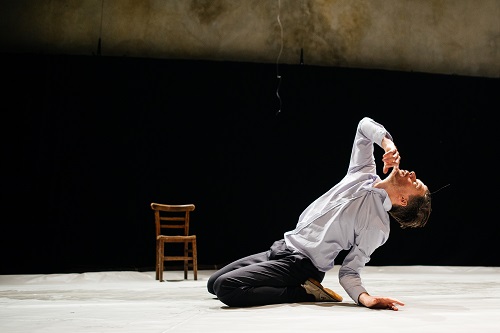
 United Kingdom Various composers, Paradise Lost (lies unopened beside me): Lost Dog, The Place, London, 9.10.2015 (J.O’D)
United Kingdom Various composers, Paradise Lost (lies unopened beside me): Lost Dog, The Place, London, 9.10.2015 (J.O’D)
Conceived, directed and performed by Ben Duke
Lighting and Set Design: Jackie Shemesh
Artistic Collaborator: Raquel Meseguer
Producer: Emily Gorrod-Smith
Production Manager: Sam Wood
Music credits: Richard Strauss: Also Sprach Zarathustra; J.S. Bach: #3 in D BWV 1068 – Air; Handel: Zadok the Priest; Debussy: Suite Bergamasque L75 – Clair de Lune; Arvo Pärt: Pari Intervallo; Nick Cave & The Bad Seeds: Into My Arms; J. S. Bach: Goldberg Variations Aria Da Capo; Philip Glass: Six Etudes for Piano: 2; Janis Joplin: Summertime; Godspeed You! Black Emperor: Moya; Odetta: Battle Hymn of the Republic
Ben Duke’s ‘re-telling’ of John Milton’s epic poem, Paradise Lost (which premiered to widespread critical acclaim at the Battersea Arts Centre in May), is a one-man, dance-theatre performance made up of several layers all of which relate to the subject of creation.
First, there is the figure of Duke himself, speaking to the audience in mock self-effacement as the creator of the piece (‘This is my musical cue, which I have just missed’). Next, there is the story of God, Lucifer, Adam and Eve, parts all danced or acted out by Duke. Then there is the layer in which he speaks as a man in a relationship that ended. ‘I can make lunch!’ he calls out, twice, to the emptiness left by the departing girlfriend. Finally, in the layer it is perhaps most difficult to make sense of, the least comic layer, there is Duke as a contemporary father speaking to, and about, his child.
All of this is crammed into seventy-five minutes. For some of them Ben Duke has only the resources of his voice, his body (in suit and scuffed trainers) and a chair to keep the audience’s attention. He performs a feat, a theatrical tour de force, but at the end it may have been for this more than for the content of the piece that the audience whooped and whistled and cheered.
Duke slips between the different layers in a way that distances us from all of them. He might, like Milton, be trying to achieve something ‘unattempted yet in prose or rhyme’. He might achieve it. Under its comic surface, this is a work of serious intent. Yet I missed the clearer, more concentrated tone that he and playwright Lucy Kirkwood brought, in 2013, to Like Rabbits, their dance-theatre adaptation of the Virginia Woolf short story, Lappin and Lapinova.
As far as the tour de force goes, though, there is a lot to admire and to enjoy. Ben Duke is very good at taking both parts in a dialogue. By using his own body, his own voice, he populates the stage. Through exaggerated gesture and cinematic sound effects that come from his mouth, he conjures up imagined landscapes of Heaven and Earth it is almost possible to see. Best of all is when he becomes both God creating Adam, and Adam being created by God. An Adam who then produces a cloud of smoke from which he emerges in a flesh-coloured unitard. A prelapsarian Adam, but one who is wearing already, confusingly, a fig leaf.
Duke is helped by lighting and set designer, Jackie Shemesh, who provides a rope for him to climb and then descend as God; chickpeas that stand in for the boulders hurled by rebellious angels, light that turns the white circle of cloth on the floor red, a bundle of twigs that becomes the Tree of Knowledge. Recorded music by Strauss, Bach, Handel, Debussy et al. creates atmosphere that is sweepingly Biblical, or quietly contemplative, as required.
‘I need you to fall,’ Duke’s God tells his Lucifer after they have met in a nightclub and set up home together. Eve says the same to Adam, after she has eaten the apple. They are words that explain why this work has been taken into classrooms where sixth-formers are studying Paradise Lost, and also into the seminar rooms of King’s College, London.
Despite this, Paradise Lost (lies unopened beside me) does not quite satisfy in the theatre. Too much mock self-effacement at the start of the piece? Too many layers during it? Too many versions, in the end, of Ben Duke himself?
John O’Dwyer